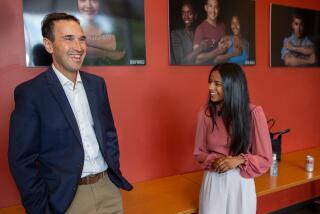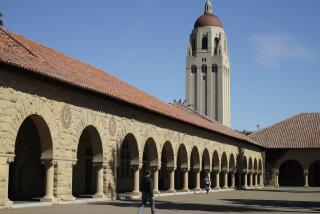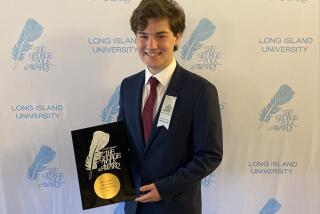Perks for Stanford Store Managers Probed by State
- Share via
STANFORD — The attorney general’s office is investigating Stanford University’s nonprofit bookstore after revelations that managers received pricey perks such as a hot tub-equipped vacation home and fancy cars.
Stanford law professor Robert Weisberg, who serves on the board of the campus bookstore, said Wednesday that the directors also have ordered an independent investigation into “alleged financial irregularities.”
“We want to know what problems may exist and whether they involved California law, federal law or any other standards of business propriety,” Weisberg said.
During the investigation, bookstore general manager Eldon Speed and assistant manager Phil Chiaramonte, who are accused of devising and benefiting from the unusual perquisites, will remain on the job, Weisberg said.
Speed and Chiaramonte, who each earn more than $100,000 in addition to an array of perks, did not return telephone calls seeking comment.
The investigations began after the campus newspaper, the Stanford Daily, in early February disclosed the bookstore’s employee and manager perks.
The two executives own a Gold Country vacation home and a mobile home that the bookstore leases for use by them and their senior employees, according to the article. The bookstore also spent $69,000 to furnish the home with a $4,300 hot tub and a $5,800 satellite dish, the newspaper reported.
The two managers and half a dozen other store employees also drive top-of-the-line cars, including a 1991 Infiniti Q45 and a 1990 Cadillac Eldorado Biarritz, that have been purchased or leased by the store.
The disclosures of the apparent lavish lifestyles of the bookstore managers and employees have shocked the campus and led to the resignation of one bookstore board member, sociology professor Sanford Dornbusch, who stepped down to protest what he felt was the board’s slow response to the allegations.
The probe of the campus store, which operates independently of the university, could become another black eye for the school, which is under investigation for overbilling the U.S. government at least $240 million for federal research overhead.
More to Read
Inside the business of entertainment
The Wide Shot brings you news, analysis and insights on everything from streaming wars to production — and what it all means for the future.
You may occasionally receive promotional content from the Los Angeles Times.










